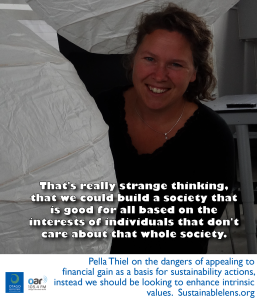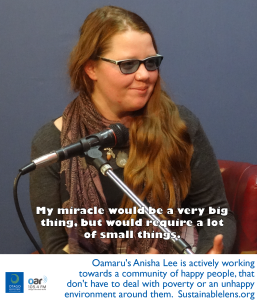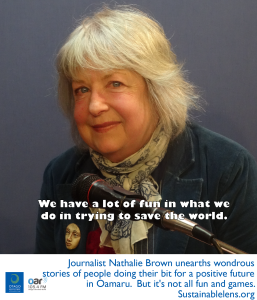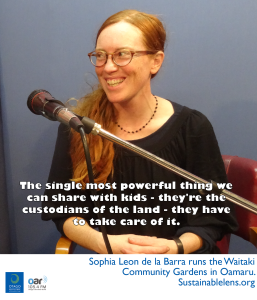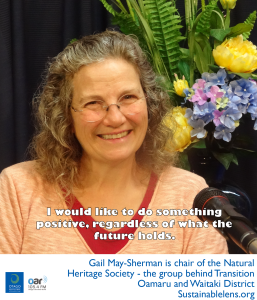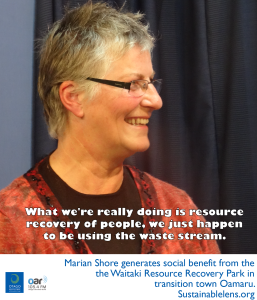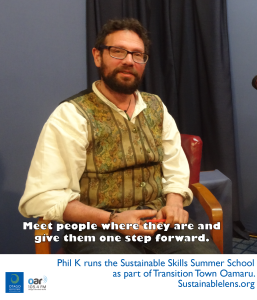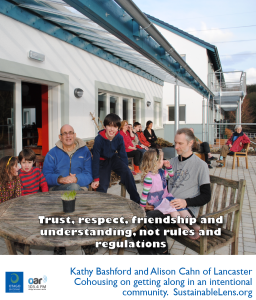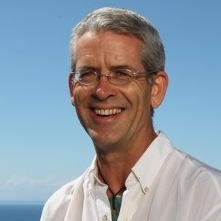When you appeal to the rational economic man, you strengthen those values, prime those values, and the intrinsic ones become weaker. If I tell you that installing these solar panels will be cheaper, then you become less interested in unity with nature, social justice – a beautiful world. And what we know is that a beautiful world, thinking and action for a sustainable future rests on those intrinsic values.
Pella Thiel an ecologist and change agent who chairs the board of the Transition Network Sweden, Omställningsnätverket, and is also working with values for transition within the Common Cause network. She is also facilitating End Ecocide Sweden.
Pella works to create meeting places that build the trust in the possibility of the big changes necessary for a sustainable, just and meaningful world.
Talking points
Addressing ecocide is a prerequisite – we can’t have thriving local communities if we don’t put an end to the destruction being done as an everyday thing.
Our current system…we think it’s OK to destroy living systems
What makes a success is when people devote time to themselves – how they are, how they work, how they interact with each other. If you can create a healthy group where people actually want to be there becasue it is fun and people support each other, that is a success factor.
Be welcoming of lots of different actors, a space holder for change to happen.
Being positive without closing eyes to severity of the situation we are in.
Transition, most horrible things and most beautiful things happen at the same time….when we actually say this has to change. if you are an addict, it is not until you realise I can be alive and I can be dead, and this is the choice I have to make.
Do we have to convince everybody? This is a stress – “we have to reach everybody, we have to be palatable enough for the middle class, everybody needs to be in this change”, which is true to a certain degree, but from what we know about big shifts in complex systems, they don’t happen that way – that suddenly many people do something different, on the contrary, they happen because a small amount of individuals do things from a very different logic. Maybe 5%, maybe even less because we are so interconnected – if a few people can spread a message that many other people resonate with…maybe even fewer than 5% to tip the system.
This path we are on is not going to take us any further, so we get to choose the path we want. So then the question is options for change – mostly the transition message that we can deal with this together.
We can deal with this together, if we do it together it’s not that scary, it can be fun, meaningful and connecting.
We have invested heavily in the current picture, and it will be difficult to leave…but we can make money frmo other things, and that money will be serving us better. Serving the complex we live in much better, much healthier, less stressful and less lonely than we are today.
Ecocide is mass damage and destruction of ecosystems where people and other organisms live. And what we’re working on…international law against ecocide.
The movement is to have Ecocide recognised by the Rome Statute…the most severe crimes – crimes against humanity, genocide, war crimes…they are tried in the international court.
This will have to be a process as we find out together, what do we accept and not accept. Today as a society we do accept mass damage of nature – and we know where that is taking us, we’re well into the 6th mass extinction.
Our collective actions are taking us to a place that doesn’t benefit any of us. We have to change that, and that’s not easy, but if we don’t begin…
Common Cause…the role of values in how we act and think, and how that relates to sustainability. Values provide guiding principles, that tell us what’s desirable, what’s normal and what’s important.
Values change and shift all the time. If we what change, we need to be conscious of values.
Values influence everything we do, but we are usually unaware of them. We don’t usually notice societal values, what values are strengthened in our society – what is perceived as desirable, normal and important in a society
Extrinsic values: if you get a reward for what you do, how people see you, material wealth, status, power…and then there are intrinsic values- they are more related to the context you are in: relationship to nature, friends and family, social justice, equality, and things such as creativity.
For us to be able to act on bigger than self issues, we have to act on intrinsic values – so they have to be the strong ones.
I caution against good and bad values, but its normative in the way that if want to move in the direction that is more collective – and just people, but also taking into account the interests of other beings, even landscapes, then we have to be focussing on the intrinsic values. –
Selfish, rational economic man…that’s really strange thinking, that we could build a society that is good for all based on the interests of individuals that don’t care about that whole society. That’s a sad picture of people being very very small – and we aren’t that small. We’re big, we have big hearts if we can believe in those big hearts.
When you appeal to the rational economic man, you strengthen those values, prime those values, and the intrinsic ones become weaker. If I tell you that installing these solar panels will be cheaper, then you become less interested in unity with nature, social justice – a beautiful world. And what we know is that a beautiful world, thinking and action for a sustainable future rests on those intrinsic values.
Transition needs a whole shift in thinking, and by appealing to your economic gain from that, you will undermine and cause collateral damage to those intrinsic values and weaken your ability to participate in the transition.
We need to go even deeper than an overthrow of capitalism. Using money as a measurement is really shallow.
We measure money, but that’s not the interesting stuff – people are interested in healthy relationships with politicians, neighbours, their children’s teachers, healthy food, beautiful setting – those are the things we should strive for.
The best things in life, money can’t buy. We know that, so why do we keep focussing on money?
How can we strengthen each other by sharing the strengths we have?
In an ecosystem it is many relationships that builds resilience and it is the same in our communities.
We can’t sustain the system we are living in now, and I don’t think that we should, so sustainability is not really very interesting, what is interesting is transition to resilience, perhaps a regenerative sustainability.
We shouldn’t have sustainable business, we should aim to have regenerative business.
If you work with values, and talk about the values you want to strengthen, then you do a lot of good, even if you don’t explain things very much. People don’t act on information, people act on values.
We need to give people a reason to act based on values.
(Success) The awareness of Ecocide law.
(Activist) Yes. I actively do things for something I believe in.
(Motivation) How important these things are to me – the living systems of the earth, the future of my children, it hit my heart how much I care for those things, and it goes a long way
(Challenges) Microscale…on the farm where I live, a healthy community, that trusts and cooperates to provide our food.
(Miracle) That all people started to believe in their own power to create good communities for themselves and for others, that they would believe in their own roles as change agents.
(Advice) Believe in your own power to create the change that you want to see in the world. And take some time to reflect on what is important to you, then manifest that in some way – draw it, write it down, tell someone else.
This interview was recorded in early September 2015.
